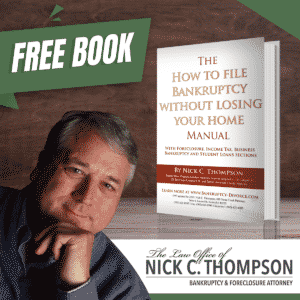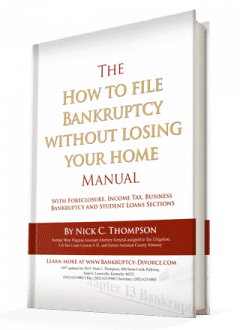It’s best to think about a Chapter 13 Plan as a contract. With this plan, you promise to make a mortgage and plan payments on time. Additionally, the Court allows you to lower the interest and pay debts over a longer period of time. However, stuff happens. In fact, sometimes, even Disability happens.
You might start Chapter 13 expecting to repay 60 payments but imagine that two years into the plan you are off work for three months due to pregnancy. Then, perhaps you go back to work but with a reduction in income because of another mouth to feed. Or, you might forget to include the annual property taxes for your home when you file. Although life changes happen, Chapter 13 Plan Modifications allow you to continue by lowering payments or the plan percentage. However, you may also change when payments are made and you sell the property.
Chapter 13 Plan Modifications in Louisville Kentucky
Chapter 13 plan modifications require you to still repay the secured and priority debts in full. However, what often happens is to simply lower the amount you repay to unsecured creditors. Interestingly, in the Western District of Kentucky, plans that repay 100% do not have to turn over tax refunds or file annual budgets. Plans over 70% are barely reviewed and are presumed to be filed in good faith. You may change to a step plan where payments gradually rise or rise in steps if you have a temporary loss of income.
⎆ The essential parts of a Chapter 13 plan.
“Unsecured debts” may be paid back at .01% or even 0% but “priority debts” and “secured debts” must be paid back in full or to the amount the security is worth plus interest. If a debt is more than the amount the security is worth, you may be able to split the amount by paying the secured portion in full. The amount of the remaining unsecured debt is paid back without interest at the same rate as the other unsecured debt.
Chapter 13 reduces unsecured debt and eliminates the interest on the unsecured debt so you can afford the plan. Secured and priority debts establish a minimum you have to repay. If you have a property you want to keep in excess of your exemptions you may do so but it increases the amount you have to repay. Essentially a Chapter 13 has to repay as much as Chapter 7 would have repaid.
Your Chapter 13 plan is supposed to describe in full how each priority and secured debt is repaid. Unsecured debts are lumped together and repaid in generally equal treatment to everyone. However long-term debt that will survive bankruptcy (student loans), business, and cosigned debt may be treated differently.
⎆ Chapter 13 debt modification as a solution.
Younger attorneys sometimes fail to understand Chapter 13 plan modifications can also modify the debt. We don’t have to just modify the plan payment or percentage. Sure creditors will object. But your obligation is to make this plan work. You have no obligation to making lenders happy. You can never make creditors happy. Give them everything you got and they will still respond with blame, shame, guilt, and fear.
Plans should be prepared perfectly when you file. You should take time to prepare the plan so if a home repair needs to be done it is described in the plan and provided for with increasing plan payments later. If you fail to let your attorney know you are paying 10,000 for a 3,000 dollar auto you will miss the opportunity to modify the debt through the plan. If you are modifying the debt or valuing the collateral you can expect the bank to object.
Of course, lenders don’t like the idea. However, it is the law that in the petition the property must show the actual value it is worth. These objections are resolved normally before the 341 and confirmation hearings. That’s a very good example of why you need to hire a professional. Since every attorney is paid the same flat fee by the court you might as well get the best one with the most experience.
⎆ You are not stuck with a Chapter 13 plan.
Spend the time to create the perfect Chapter 13 plan when you file. But remember, to meet your needs, Chapter 13 plan modifications can change the plan at any stage up to and including the last payment. In other words, you are not stuck with a plan. The plan requires you to use your best efforts to repay the debt and turn over all your disposable income. Plans may have payments increases should you suddenly have a large pay increase or it might also decrease. However, it is rare for payments to increase and common for them to decrease.
Chapter 7 cases almost always obtain a discharge and successfully finish. Although Chapter 7 has the problem of paying the attorney fees upfront, they are short and simple. Chapter 13 plans often have to be amended because within 5 years something will happen. Things change. If you have made most of your payments and you are unable to make your payments, you might qualify for a hardship discharge. You may even be able to convert your case to Chapter 7. Or, you can often modify the plan to pay a lower percentage or dollar amount. In fact, this is an area where you can be very creative to ensure the plan is a success.
Other changes may require you to buy a different auto, buy a home, or sell a home. All of these things are considerations in a plan because of the ability to amend the plan to fit your needs. However, you have to remember that the plan will always have a floor and a ceiling that requires you to repay a minimum amount if you have secured, or priority debts, and property in excess of the exemptions.

Resources for Bankruptcy
Louisville Kentucky Bankruptcy Forms
How to Win Great Chapter 13 Plan Payments • Video
How to Calculate Your Chapter 13 Payment Plan
Student Loan Income-Based Repayment (IBR)
Avoiding Foreclosure with Bankruptcy
If you are thinking about filing bankruptcy, don’t delay because timing is crucial. I am here to help you. So, contact my office right away to start the conversation. Nick C. Thompson, Bankruptcy Lawyer: 502-625-0905.
